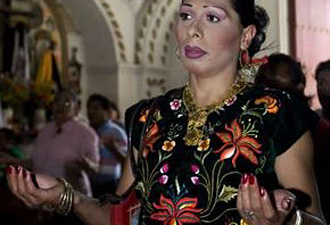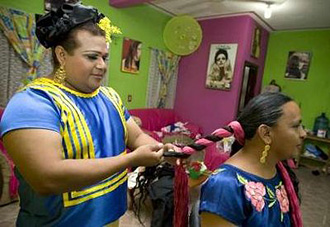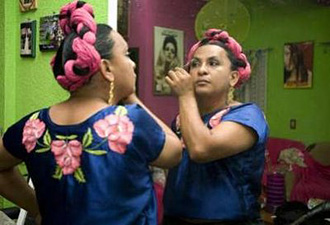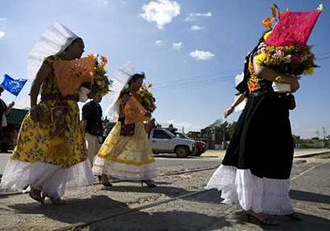
|  |  |  News Around the Republic of Mexico | November 2008 News Around the Republic of Mexico | November 2008  
Mexican Transvestite Fiesta Rocks Indigenous Town
 Reuters Reuters
go to original


| | A man dressed in the traditional costume of a Zapotec woman attends a mass at a church in the town of Juchitan in southern Mexico, November 22, 2008. | 
| | Pedro Martinez (L) braids the hair of a friend dressed in the traditional costume of a Zapotec woman. | 
| | A man, dressed in the traditional costume of a Zapotec woman, plucks his eyebrows. | 
| | Men dressed in the traditional costume of a Zapotec woman walk during a parade. (Reuters/Stringer) | | |
Juchitan, Mexico - Attaching flowers to a ribbon headdress, pulling a lace slip under an embroidered skirt and draping a necklace of gold coins over his head, Pedro Martinez puts the finishing touches on the traditional costume of Zapotec women in southern Mexico.

"When I get all dressed up like this my father always says, 'Oh Pedro! You look just like your mother when she was young," beams Martinez, 28, gluing on fake eyelashes in front of a mirror.

Martinez spent two hours in the hair salon he owns getting ready for this weekend's festival of the "muxes," indigenous gays and transvestites in the town of Juchitan who have found a haven of acceptance in Mexico's macho society.

The muxes (pronounced moo-shes), mostly of ethnic Zapotec descent, are widely respected in the southern town where a dance and parade that crowns a transvestite queen and celebrates the harvest has been held annually for the last 33 years.

Anthropologists say the tradition of blurring genders among Mexico's indigenous population is centuries old but has been revived in recent decades due to the gay pride movement.

Several dozen muxes were blessed by a Catholic priest at a mass before joining visiting transvestites and other townsfolk at a raucous party on Saturday night. The muxes wore either traditional local costumes or ball gowns and high heels.

The beer-fueled fiesta continued into Sunday at a parade through town.

Some of the muxes, a Zapotec word derived from the Spanish for woman, or "mujer", dress as women year round and others are gays who only don women's clothes at the annual party, or not at all.

The area around Juchitan, a laid-back town near the Pacific, has a history of women playing leading roles in public life.

"The legend here is that mothers pray for a gay son who can take care of them when they are old," theater director Sergio Santamaria, 56, said over a traditional breakfast of iguana soup and sweet corn tamales.

DUAL-GENDERED GODS

Native people in the Americas with ambiguous gender were often regarded as wise and talented, said Rosemary Joyce, a professor of anthropology at the University of California at Berkeley.

"They were seen as have having a kind of spiritual power that comes from being more like the ancestors who are mothers and fathers at once, and more like the divinities who may be dual gendered," Joyce said.

Anthropologists have found evidence of mixed gender identities across Mesoamerica, from Mayan corn and moon gods that are both male and female and Aztec priests who ritually cross dressed.

The Spanish conquest in the 16th century and the Catholic Church snuffed out much of that tolerance.

"The colonizing power was very rigid about sex. They came in and rapidly suppressed all these practices, which doesn't mean they went away. It means they went underground," Joyce said.

While homosexuality has long been accepted in Juchitan, it is only recently that muxes feel secure enough to cross-dress and they have taken on causes like AIDS education, since the region has one of the highest HIV rates in the state of Oaxaca.

"There have always been muxes, but before they would wear just a dress shirt with a feminine touch, like gold buttons. The transvestites are the new generation," said Santamaria.

(Editing by Kieran Murray) |

 |
|  |



